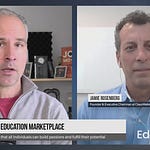Jonathan Hughes, Associate Director of College Planning and Content Creation at the Massachusetts Education Financing Authority, joined me to discuss the organization's work of helping students prepare for post-secondary education. We discussed how MEFA has evolved over its 40 years, including the addition of MEFA Pathways, an initiative focused on career navigation.
Michael Horn:
Welcome to the Future of Education, the show where we are dedicated to a world in which all individuals can build their passions, fulfill their human potential, and live a life of purpose, and to help us think through how individuals navigate so that they can do all of those things. Delighted to have another neighbor to the show and our guest, Jonathan Hughes. He's the Associate Director of College Planning and Content Creation at MEFA, the Massachusetts Educational Financing Authority. We're going to find out all about that and more in just a moment. But first, Jonathan, thanks so much for being here. It's great to see you.
Jonathan Hughes:
Yeah it's a pleasure to be here. Thank you very much.
The History of MEFA
Michael Horn:
Yeah, you bet. So let's start with just that. Like, you know, the history of the Massachusetts Educational Financing Authority, which in the state we call MEFA, but people outside of Massachusetts might not know the acronym. Tell us the history, how it's changed over the years. What does it do now?
Jonathan Hughes:
Yeah, absolutely. So MEFA, as you said, is the Massachusetts Educational Financing Authority. And we were actually created, we're a state authority. We were created by the Massachusetts State Legislature back in 1982, so about 42 years ago. And what we were initially created to do was to offer a loan. We were actually created at the behest of colleges. At the time, there was a limit on the plus loan, which is the parent loan for undergraduate student, at $4,000. And there was not a lot of educational loan options for families to go for financing.And so MEFA was created to offer that loan. That's something that we still do. However, as I like to say when I'm doing presentations, you know, since 1982, as you may have noticed, the cost of college has continued to go up. So we have a public service mission to help families to plan, save, and pay for colleges. Just offering that loan wasn't going to be sufficient to do that. So we expanded in the nineties to offer two savings programs. In 1995, we added the U Plan, which is a prepaid tuition program. And in 1999, I believe it was 1999, we added the MiPA U Fund, which is the Massachusetts 529 plan. So that takes care of paying for college and saving for college. The third part of that being planning. That really started to bloom about maybe 20 years ago or so, where we really started to flush out our guidance initiative. And so we offer hundreds of free seminars and webinars every year, you know, in person and virtual, on all topics related to planning, saving, and paying for college. So that's savings, admissions, college financing, et cetera. And now even further sort of branching out from just being college focused, like a lot of things recently, you know, we're sort of branching out to include college and career training. So we have MEFA Pathway, which we'll talk about later on. And we also were selected to offer the state's 529A, or ABLE plan, which I'm not sure if you're familiar with it, but it is essentially, it works in a similar way to the 529 college investing plan. It's for individuals with disabilities, so you can save in a similar way, tax deferred, and use those funds to tax free for qualified educational, I'm sorry, not qualified educational, but qualified expenses, which include educational expenses, but also health, assistive technology, transportation, daily living expenses, things like that. So that is a real change for us as well, and a real expansion of what we do. So I know I'm talking a lot, but it's hard to encapsulate everything that we do, and it takes a lot. But also, I think the backbone of who we are is offering that free guidance to people. So we are here for people in Massachusetts, but anyone as well.
The Evolution of the Organization
Michael Horn:
Okay, so that's interesting. So I'm curious then state authorizes you, that's how MEFA is created. It's evolved a lot, as you said, not just loans, abilities to save, like the 529 Able Plan you just talked about, the guidance and so forth, is that, and then obviously, you said the big thing also not just college but also career guidance, is, you know, how does an organization like this evolve? Is this an independent set of decisions? Is this a state sort of mandates that help you evolve? Like, what's the interplay with the state at this point around those decisions?
Jonathan Hughes:
Well, I think it's a bit of both of those things. So we have certain things like MEFA Pathway, which was, and then we're going to talk about that later on. That's our college and career portal. That was an initiative from the governor's office at the time, Governor Patrick, and we set to work creating at that time, it was called your plan for college. But also, you know, we, in order to do the work that we need to do and be a resource for everybody in Massachusetts, we have partnerships with high school counselors, college administrators, and try to be a resource for them and for their population. So we hear basically what's needed. I'll give you a good example of this. We heard from our college administrators that they were seeing a lot of students who were confused at the point of when they were receiving all their financial aid award letters from colleges, and they needed to make that decision of where they were going to go. A lot of them were having a difficulty deciphering the letters and then comparing the offers among different schools. So, as you know, they're really confusing.
Michael Horn:
Yeah.
Jonathan Hughes:
Yes. It's confusing when you're looking at one of them.
Michael Horn:
Let alone comparing them. Yep.
Jonathan Hughes:
Right. And, you know, there's not a lot of uniformity between award letters. So we created this campaign called our paying the college bill campaign, where we go and sort of break down what you might see in award letters and also how you figure out what your balance due is at each. And we encourage people to actually bring their award letters so we can help them compare and figure out what they have due at each college. So a little bit of both. Some things come from sort of top down, and some things, a lot of things, I would say, are in reaction to what we hear from partners and what folks need.
Building In-State Networks
Michael Horn:
No, that makes a lot of sense. Okay, one last question, and then I'm going to switch to the MEFA Pathway. But I'm just sort of curious. In general, you have all these products, services. I didn't realize people outside of Massachusetts could use them as well. But within Massachusetts, does the relationship as a state created entity, even though you're a separate nonprofit, does that allow you to get better distribution, to have these partnerships with high schools? Or, you know, how does what you offer get in the hands of not just students, but frankly, the students who maybe need the most support and guidance around these questions that, you know, maybe they're a first gen potential college student, they might not have that knowhow in their household they really need a service like yours. They, you know, plausible.
aren't getting the support given what the student to teacher, excuse me, student to guidance counselor ratios are something like what you offer would seem really important. How do you get that distribution and connection with schools, district students?
Jonathan Hughes:
Yeah, and I think you hit it there. I think it is the relationship with the counselors, and it is relationship not just with counselors, but with CBOs, community based organizations as well, other agencies like agencies. For example, there's one called Mass EdCo, which is headquartered in Worcester, but it's also a free resource for students to use to file financial aid forms and help figure they can help them do a lot of things, basically. And I think so. Trust is key and ease of use, I mean, we are a free resource for folks to use. We do try to encourage guidance counselors or high school counselors rather, to reach out to us with any questions. We are happy to take calls. We do have free appointments that people can set up with us and we do, as I said, take that feedback from counselors.
What are their students experiencing? We work with a sort of number of ambassadors that offer free financial aid nights. We will come up with materials, and a lot of this fits in with me for pathway as well, because high schools that use MEFA Pathway have access to us for free, and we're able to sort of hop on a call or run out to a high school to help them administer that. So it is just a lot of important partnerships that we cultivate, and that's why, as I said, trust and usability is so important for us.
Michael Horn:
Gotcha. And you're able to offer it free because the state helps fund that or how does that work?
Jonathan Hughes:
Yeah, so we are, financing is done through our loans. So that's how we keep doing what we're able to do. And that's why the loan piece of it is very important to us. That's how we keep the lights on. That's how we keep going out to colleges and to high schools and to K-12 schools and to offering everything that we need to offer to our citizens in Massachusetts and elsewhere.
MEFA Pathway
Michael Horn:
Gotcha. Okay, so let's get, we've teased it now multiple times coming up with another question, but MEFA Pathway, what is it? Where did it come from? What's the purpose and what does it do? And have you had to partner with folks to be able to stand it up? What does that look like?
Jonathan Hughes:
Yeah, so MEFA Pathway, I said, was created by, through an initiative through the Patrick administration at the time, it was 2011, and it was meant to be a free college and career portal for students in Massachusetts. So that was your plan for college, as I said, and went through some iterations. It became your plan for the future later on, I think about 2017 was when it became MEFA Pathway, and it's just continued to develop. I mean, we work with, to build out the platform, a company called Folderwave, and we sort of have partner schools that we try to get. We're sort of enlisting schools in the effort to use MEFA Pathway in their schools as their college and career portal. Now, you know that there are other college and career portals as well for use in high schools and for middle schools. And so it's been, you know, a process over many years of trying to get more and more schools. And the thing I can say about MEFA Pathway, how it has changed, it has just grown more and more expansive I mean, every time I look, they're sort of adding something to MEFA Pathway. Um, so it's for use beginning in grade six. And of course, in grade six, you're starting to. I just have a son, actually, who just started grade six, so I can't believe he's at the point now where he can set up a MEFA Pathway account and try to figure out what he might want to do for a career. But, yeah, I mean, when you're in grade six and you start to use this, it's going to focus primarily on fun things, you know, things that you may want to do for a career. What are your interests? What do you like to do? What are you good at doing? What's your learning style, et cetera. When you get to high school, of course, it's gonna be a little bit more in depth, a little bit more planning your courses, et cetera. And the functionality of it has just gotten more and more in depth and comprehensive. So you can use it as a sort of just, any student in the Commonwealth can open up an account or anywhere, really, but it's mainly targeted towards Massachusetts can open up an account and do these things, or a school, a high school or school district can opt to use MEFA Pathway and use it for free and have sort of their guidance department use it as their portal. Different schools can use it at different levels. So some might use some parts of it and some might use another college and career portal for something else. So it has just continued to evolve and to get more in depth and to encapsulate more, not just college. As you can see, it started off your plan for college, and now it's the college and career portal piece, which is continuing to be built out more.
Differentiating MEFA from Other Career Navigators
Michael Horn:
So it should be said in the interest of full disclosure FolderWave, who I've done some advising for, is the one that connected us together for this conversation. And obviously, then, as you just said, providing some of the technical infrastructure behind what you all offer. I love to stay with that journey that you just described where it's very, you know, what do you like doing? Fun,engaging. as you get into high school, more serious navigation questions around choices that have to be made based on those interests and understanding of where you tick and so forth. But help us understand how it's different from, you know, as you mentioned, there are a lot of tools out there. There's a couple of market leaders out there, right, that have big presence in more high schools than middle schools around this college. Navigation in particular, they’re starting to add careers as well. What really differentiates MEFA Pathway from the other things out in the market?
Jonathan Hughes:
Sure. Yeah. No, its a good question. And I think a couple of things make it different. The first I’ve mentioned a few times is that it’s free. So it’s a free resource for schools to use or for students to use. And so that is different also to be trained and support on this is also free. I know that that's not the case with other college and career portals.
They might charge to be trained or for troubleshooting, what have you. I was just sort of in preparation for this, talking with some of the pathway team that goes out to high schools. And we did, I think, 150 or 160 visits or conferences with high schools over the past year. So that's one thing. The other thing is we do have that interplay with counselors. So we do solicit feedback and we do act on that feedback as quickly as we can. There's a relationship there that's really, really close and that extends to something we hear a lot about lesson plans that we can offer. So we have created lesson plans for teachers, counselors to use in their school. So we heard from counselors that, you know, we have all this great information on MEFA Pathway, but, you know, on top of classes and on top of everything else that students have to do, they're not really getting this information. So it would be great if they could use it in classes. So we developed lesson plans for advisors or teachers to use in class so that they know students are getting that information. And it's all sort of lined up with MyCAP guidelines, which are through the State of Massachusetts. So it stands for my career and academic placement. And so that makes us different also because we have that Massachusetts focus to us. So we are aligned with the MyCAP program. We have specific tools on our site on MEFA Pathway where people can go and see what their savings might be. If they go through a Massachusetts community college and use the mass transfer program, see what their savings may be versus not doing that, they can search careers and save those that are Massachusetts focused as well. So those few things I think make us different. And also the other thing is that, you know, as I said, we are, everything is done with sort of a human face. We're a small shop and we are very responsive to questions or issues.
Shifting Mindsets towards Career
Michael Horn:
No, it makes sense. So I actually want to stay on something that you mentioned because you had the career academic placement standards, you talked multiple times about how MEFA Pathway and you all in general, are not just sort of a “college for all” shop anymore. Career is a much bigger piece of this. This is obviously, you know, in some ways a back to the future moment for high schools across the country, but with the different emphasis that we want people to really make informed choices as they're navigating this college career, not just one time decision, but frankly, like interdependent set of decisions throughout their lives. I just love your perspective on how the state, the standards, you all have evolved to help people really think about the tradeoffs or questions that they want to be asking is they're thinking, hey, I'm going to graduate high school. Have I set myself up to go right into career first trade school, community college, four year college, gap year. There's a lot of decisions there. How have you evolved that to help? You know, pretty like, these are very different initial pathways, big steps that have big implications. How do you help people think about that?
Jonathan Hughes:
Yeah, and I think, you know, that's a shift that you've seen across the industry and across the country in general. I mean, just hearing folks talk about college and career is different than it was 20 years ago. As I mentioned, and I'll mention it again, when we first started off, it was you were playing for college. And when I started working at MEFA a long time ago, we were completely college focused. And as that has changed, we have to grow to meet where people are and to adjust for other pathways as other people are doing. And it's hard. Everything in high school, counseling or counseling and postsecondary endeavors, it's all, like you said, interlocking sets of decisions.
You have to get in front of people at the right time to get them thinking about the right thing so that their next step is the right step and putting them on the right path. I think how we do that through pathway, well, how we do it through MEFA in general, just start talking about these things and mentioning that there are other ways other than college. And it's not that everybody has to go to college. College will be important for many people. It's a great investment in many ways, but not everybody needs to go or goes to college. It's just whatever happens after high school, we want our students to be in a good position to succeed.So I think how we do that through MEFA Pathway is getting in front of them at a young age, in the middle school years, to try to see, to try to get kids thinking about what they might want to be and what they might want to do.
This is also where the lesson plans for high schoolers come in, too. So a lot of these lesson plans are designed to get folks thinking about this. And this is what the MyCAP program is all about as well, to sort of let the student drive the process. And the first part of that is self discovery. The first part of that is knowing what the student wants to do for themselves, know what they want to do, and go that way. Now, that's not going to be the reality for everybody. And I know that I can only imagine myself at 17. You could have given everything, put in everything in front of me, and I still probably would have had a hard time. But to try to get that in front of people and give folks as many ideas as possible and to let them know that there are viable pathways wherever they may want to go, there is something out there for them. And then to the extent which they can use the tool and to try to carve these pathways out, there will be, as we were mentioning, a new focus on work-based learning. As there are more pathways for work-based learning in high schools, I always think of tech. That's the first thing I always think of when you talk about work-based learning is technical high schools. I've talked to a lot of technical high school students who go out to a job for, you know, one day a week or one week every month, whatever it may be. And I always thought that that's such a great thing to do. And I talked to a lot of them who love it. You know, I interviewed students on my pod, on our podcast at MEFA at a technical high school in Massachusetts.
And the reason we got in there was because they were a pathway school. So they use MEFA Pathway to do various things. But this work-based learning is getting more and more notice from a lot of people. It's something that a lot of high schools and colleges are looking at. For our work-based learning, we have a portal where, well, not a portal, but a feature where counselors can list all the work-based learning opportunities that are available to their students. Their students can go on, if they log on to MEFA Pathway, see the options that are available to them, apply for those internships, job shadowing programs, whatever it may be, externships, and apply that way. What's coming soon, hopefully, is a employer portal where they can manage that part of the process as well. So this is something, as I said, that just giving students exposure to that and letting them know that there are other pathways out there and that they're valuable and they can lead to good outcomes and good salaries.
Michael Horn:
Yeah, no, I mean, I think that's part of the name of the game. And obviously, to your point, I probably was similar to you in this way. I would have been very hard for me at age 17 to imagine. But the flip side is, if I'd had more exposure to lots of different work-based learning opportunities, maybe actually, I would have known far more about what made me tick and what didn't, at least to the point that I could have started to rule certain things out in a meaningful way, which I often think we expect people to be like, oh, that's the thing. I think we're much better as human beings saying, that's not the thing, nor is that. And it might be these five other things.
If you can help with that. I think it makes a lot of sense. What do you see in terms of utilization numbers and sort of, I don't know if you have quantitative ways of looking at impact, but at least qualitatively?
Jonathan Hughes:
Yeah, I mean, we do have some numbers in terms of accounts. I mean, there's about, I would say around 55, 56,000 accounts set up the MEFA Pathway. We have about 180 schools or so that are in Massachusetts that are signed up for MEFA Pathway, and they may be participating to varying degrees. Right. So some may use, you know, the lesson plans, but not use the common app parchment integration, for example, to send all of the transcripts and letters of recommendation to the colleges. That's a tool that we have on MEFA Pathway, but, you know, people can use it to their comfort level. And we are just, I think as high schools, you know, they have contracts with certain other college and career portal providers. They may sign up with me for pathway.
These things take a long time, but, yeah. So, and from what we hear from counselors and from students, we know that it's really working out for people, particularly lesson plans, scholarship searches, and app applying through school. But there's so many tools, and the comprehensive nature of it is so great and getting greater all the time. I feel like I was talking about MEFA Pathways of its own, little sort of separate thing, and now I feel like it's, it's the other head on the shoulder, so to speak, so well.
How Guidance Counselors Are Managing the Shift
Michael Horn:
And it's gotten a lot of support from the governor's office, the current governor's office, obviously, with the public service announcement and so forth. And if I'm not mistaken, 180 high schools in Massachusetts is about 40, 45% probably, of high schools in the state is my guess.So that's, that's pretty good coverage there. Last question as we wrap up. It seems to me the other part of this equation as we move away from “college for al”l to a more robust understanding of what individuals can do to lead productive lives as they leave high school is that there's a fair amount of re education of counselors, like a lot of the guidance counselors, you know, for the last generation, it's sort of been college, college, college. That's a big switch on them. I'm just curious if you see, you know, how are they doing with that switch on the ground? You probably have a view of that. And I, I imagine a resource like the ones you provide is actually super useful to them, getting educated around other options beside the, you know, the ones that they've been focused on for the last 30 years.
Jonathan Hughes:
Yeah, that's a great point. Yeah, it really is. To be honest, I'm asking them so much of what they're seeing from their students that they, they're the ones who told me, you know, because I asked them, are, are you seeing more students go directly into the workforce to college or you see them, you know, going the career vocational training pathway? And a lot of them say yes. And I think that there's a sense, too, among students and parents that, you know, this is, I think it's different from when you and I were going to college in a way, and, or when we were graduating high school that this is seen as more of a viable option for more folks than it was. So, yeah, I don't, you know, to be honest, I don't really know. I don't have an answer for you.
Michael Horn:
I was just curious because it seems like a stark shift. And so services that are maybe, you know, have bigger budgets, right, to do the work and resources that MEFA Pathway has and the lesson plans, it seems like that can be a real resource not just for the students but maybe for the counselors as well.
Jonathan Hughes:
Yeah. And I think that's where employers come in and other CBOs and other sort of industry partners and local partners come in to sort of shape that. But, yeah, I think that makes sense.
Michael Horn:
That makes sense. Jonathan, really appreciate you coming on to explain all about not just MEFA Pathways but MEFA itself as an organization. Where can folks who, you know, they, they finish this conversation? They want to learn more. How should they do so?
Jonathan Hughes:
Well, they can go to a couple of places. They go to mefa.org. they can go to mefapathway.org and they can follow us on our social media channels. They can follow, they can look for the MEFA podcast, but they can go to?
Michael Horn:
Where they get to hear your voice on if they lucky them, right
Jonathan Hughes:
They get to hear me. Yes.
Jonathan Hughes:
I would recommend folks to go to mefa.org or mefapathway.org for more information.












